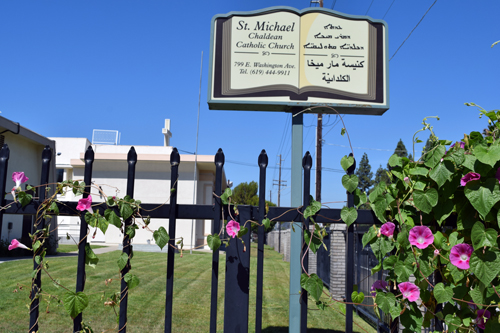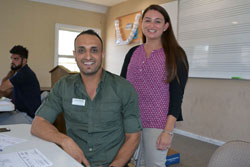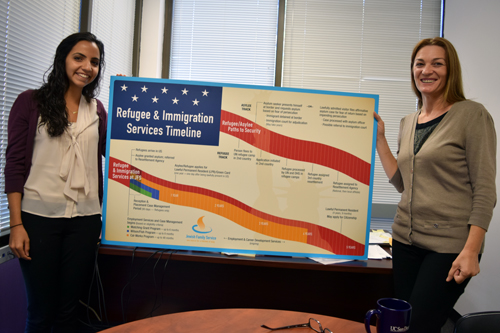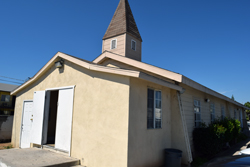
-50th in a Series-
Exit 18, Mollison Avenue, El Cajon ~ Refugee Resettlement Program
By Donald H. Harrison


EL CAJON, California –With millions of refugees lingering in camps around the world, receiving refugee status in the United States is a difficult process – only a fraction of the refugees ever make it. And for those among the lucky few, the road to rebuilding their lives and gaining economic security is strewn with obstacles. But working in rented quarters at St. Michael Chaldean Catholic Church at 799 E. Washington Avenue, staff members of Jewish Family Service –some of them Jews, others Christians, others Muslims – are helping to ease the way for numerous refugees from Iraq.
And why shouldn’t there be such inter-religious cooperation? comments Husam Salman, an Iraqi Muslim who now is on the JFS staff. If one reads history, one knows that there were periods when Jews and Muslims, working together, excelled in learning and sciences in places like early Spain. He said that from his perspective, all religions teach about peace, love, and helping one another, but somehow governments and their politicians are able to turn people of one religion against another. This shouldn’t be, and thankfully, he says, for the most part it doesn’t occur in his new adopted country of the United States.
Jenny Daniel, employment coordinator for Jewish Family Service’s refugee resettlement program, said that she has never heard a single Iraqi refugee express concern or unwillingness over working with a Jewish organization, or vice versa. A Jew of Syrian and Mexican background, Daniel would have sensed hostility if it were there, but it simply isn’t, she said. The refugees are war-weary people who fervently want to get on with their lives, and are glad for all the help that they can get.

Etleva Beijko, an Albanian who directs the JFS Refugee and Immigration program in San Diego – and who professes no religion whatsoever – said often neighboring countries, such as Jordan, to which Iraqi refugees flee, don’t have the resources to absorb all the people who are running from sectarian violence. So the United Nations High Commission for Refugees becomes involved, negotiating with third countries to take in those refugees and give them a new chance at productive lives.
The United States, Australia, New Zealand, and several countries in Europe are the nations that consistently agree to accept refugees. A presidential proclamation determines the number that will be accepted each year in the United States. Priority is given to those refugees who have skills needed in these destination countries, as well as to refugees who are seeking to be reunified with family members already in those countries.
Once each country tells the United Nations High Commission for Refugees how many people it will accept for resettlement – the total being only a small fraction of the number of refugees who would like admittance – the winnowing process begins. Refugees with severe health problems or criminal histories often are rejected by destination countries. Refugees with little likelihood of being employed may be rejected in favor of those who are ready to join the workforce.
In the United States, there are nine national agencies that help to resettle refugees, many of them at least nominally affiliated with one faith community or another. Especially active are Catholics and Lutherans, who have large organizations and networks throughout the United States. The smallest of these nine agencies, handling 4.7 percent of the total number of refugees coming to America, is HIAS, which got its start in 1881 as the Hebrew Immigrant Aid Society helping Jews from Eastern Europe fleeing anti-Semitic pogroms.
HIAS was again active when there were influxes of Vietnamese refugees in the 1970s, and Jewish refugees from the Soviet Union in the 1980s and 1990s. Since the First and Second Gulf Wars, HIAS has been involved with the many Iraqis streaming to San Diego County. In 2015 it was also settling groups of refugees from Burma and from the Congo.
El Cajon, within which St. Michael Catholic Chaldean Church occupies the southwest corner of Mollison and E. Washington Avenues, has a large population of Iraqi immigrants and refugees, second only to Detroit. With Michigan experiencing a downturn in its economy, more and more Iraqi refugees have been directed to San Diego, where Jewish Family Service serves as the HIAS affiliate.
In 2014, JFS resettled some 447 people in San Diego County comprising 193 family units, according to Beijko.
Well before a refugee family arrives in San Diego, JFS is advised that they would like to come. It is up to JFS to decide whether it is able to accept sponsorship of that family based on such factors as their family composition, their medical backgrounds and their employability “because we know that San Diego is an expensive city to live in and housing is not cheap,” Beijko said. “We have to make our decision as well on language ability and staff. If we accept a case, then we tell HIAS, and at that point the case is placed with us. A couple of months down the road—perhaps two to six months —when the family is ready to travel, we receive notification that they will arrive in two to three weeks. Then we start finding housing, furnishing their apartments, making sure that we have the paper work done…”
“We make arrangements for airport pickup, make sure that they have a first meal, make sure that they have enough food in their refrigerator,” Beijko continued. “Right away we need to start services. There is a core service list, certain services that we have to provide within very specific time frames. The intake needs to happen within five days. They need pocket cash within 24 hours. A home visit needs to be done; orientation; enrollment in programs; referrals; connections with the county; schools; health care providers – and that is just the initial stage, which we call ‘R&P’ for ‘reception and placement.’”
In addition to “refugees,” JFS sometimes is also assigned responsibility for “asylees” – that is people who have come to the United States on their own and have asked for asylum based on fear of persecution. Only after a determination is made by the government that the people in question are eligible for asylum are they able to receive government-funded services such as those that JFS provides to the refugees.

A small building on the grounds of St. Michael Chaldean Catholic Church is a good place for JFS staff members to meet with refugees living in El Cajon because for the refugees, who often have limited access to transportation, it is easier to get to than the administrative offices for JFS’s Refugee and Immigration Programs on Mission Gorge Road in San Diego, near Exit 8 of Interstate 8.
In Beijko’s office is a large flow chart detailing the steps JFS must make in the refugees’ five-year journey between arrival in the United States and their eligibility to apply for U.S. citizenship.
One of the most important responsibilities is to help the refugees find jobs so they can support themselves. This program is funded under provisions of the Wilson-Fish Act, named for Pete Wilson and Hamilton Fish Jr. Wilson was a mayor of San Diego, U.S. senator and later a California governor, whereas Fish was a congressman from New York. While the act is called “Wilson/ Fish” here in San Diego, in New York the names of the two sponsors are reversed.
Daniel’s responsibility includes coordinating matching grants under the Wilson/ Fish program, which covers single refugees as well as couples without children. Another federal program provides matching grants for families with children.
To find work, refugees usually need to speak English, so they are enrolled in English-as-a-Second-Language (ESL) classes. “We also do job readiness training within the first two to three months that they are here,” Daniel said. “We prepare them on how to write a resume; how to prepare for an interview; what is appropriate to wear for an interview in the U.S. The level of experience our clients have varies. There are clients who never have worked before and are illiterate, even in their own language (Arabic), and there are clients with PhDs. Some clients come with high expectations of re-entering their careers as soon as they get here – so it is harder to place them because both programs (those for families, and those for singles and couples) are entry-level employment, the goal being to get them that first job. We will get them into the American work force in order to help them grow their careers.”
Most, but not all, these jobs are as food and beverage workers, or as hotel workers, because San Diego County has a voracious appetite for laborers in the tourism sector. The refugees also receive assistance payments calibrated to their wages to make certain they have enough to house, feed, and clothe their families.
Before he became a caseworker for Jewish Family Service, Salman, a Baghdadi with a law degree, went through the program, working at a recycling center in San Diego, and later as a cashier at Walmart.
Whether the refugee was a doctor, lawyer, or other professional in the old country, said Salman, “the thing is that you are new in this country. The most important thing is that you need to start with something, so that you can have work references, something.”
Helping to place the refugees in jobs, he said, “we help them to stand on their own legs.”
Ilena Gudino, who helps to supervise the employment program, said that a majority of the refugees “want to get a job and to become more involved in San Diego society and understand how everything works here. Even if they were doctors, they want to get into the process of building a livelihood and getting integrated into society.”
Salman is a believer in the American dream: “If you work hard; if you study; if you think for yourself; then the more you work, the more you are going to succeed,” he said. “It is like a race. You can’t just reach your goal without doing something.”
He contrasted the hope of America – that people who work hard can make something of themselves – with what he described as the desperation of Iraq, where people who work hard still may end up nowhere because the way up is blocked. “Here,” he said, “it’s a better life.”
Beijko said that seeing refugees settling in this country and working hard to give their children opportunities often resonates with members of the Jewish community, who find emotional parallels to the experiences of their own immigrant parents, grandparents or great-grandparents. Among the largest group of people to donate furniture, household items, and even money (which always is needed) to the program are members of the Jewish community, Beijko said.
She said that such donations can account for important differences in the quality of the lives of refugees.
For more information, Beijko may be reached via etlevab@jfssd.org
*
From Mollison Avenue exit, head south on Mollison to Washington Avenue, and turn right. The church is on the left hand side.
Next: Memories of a child’s murder
*
Harrison is editor of San Diego Jewish World. You may comment to him at donald.harrison@sdjewishworld.com